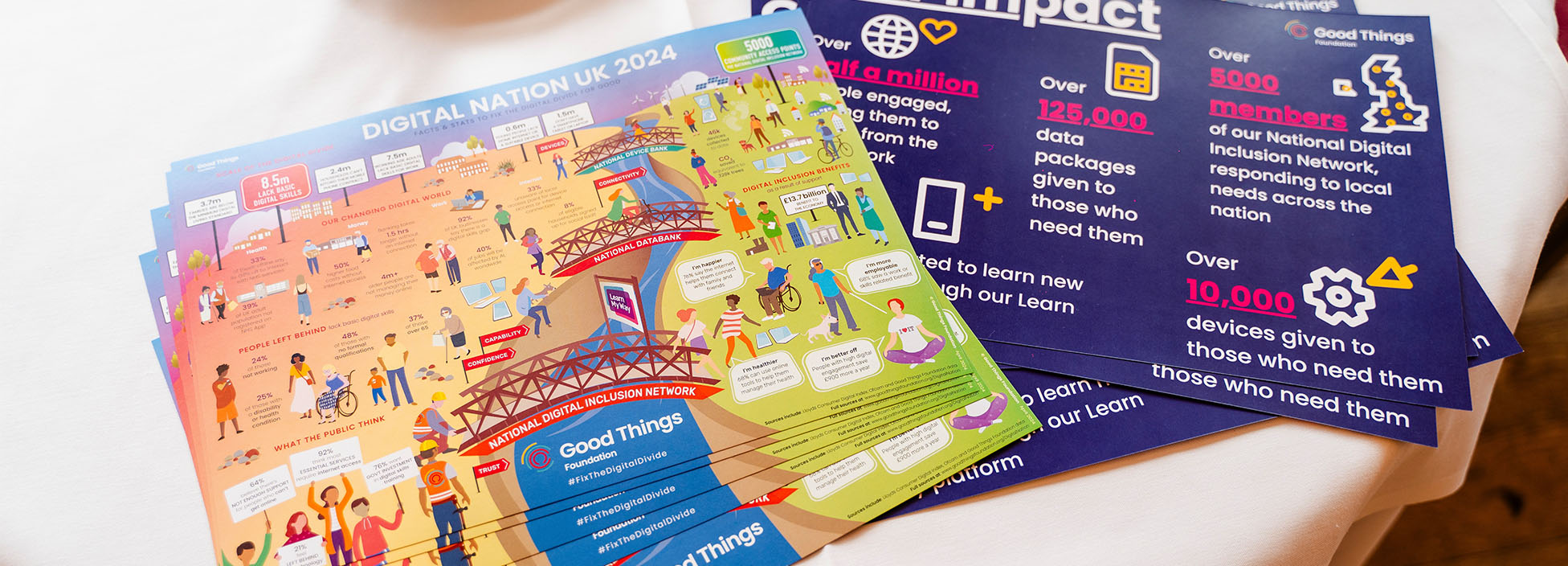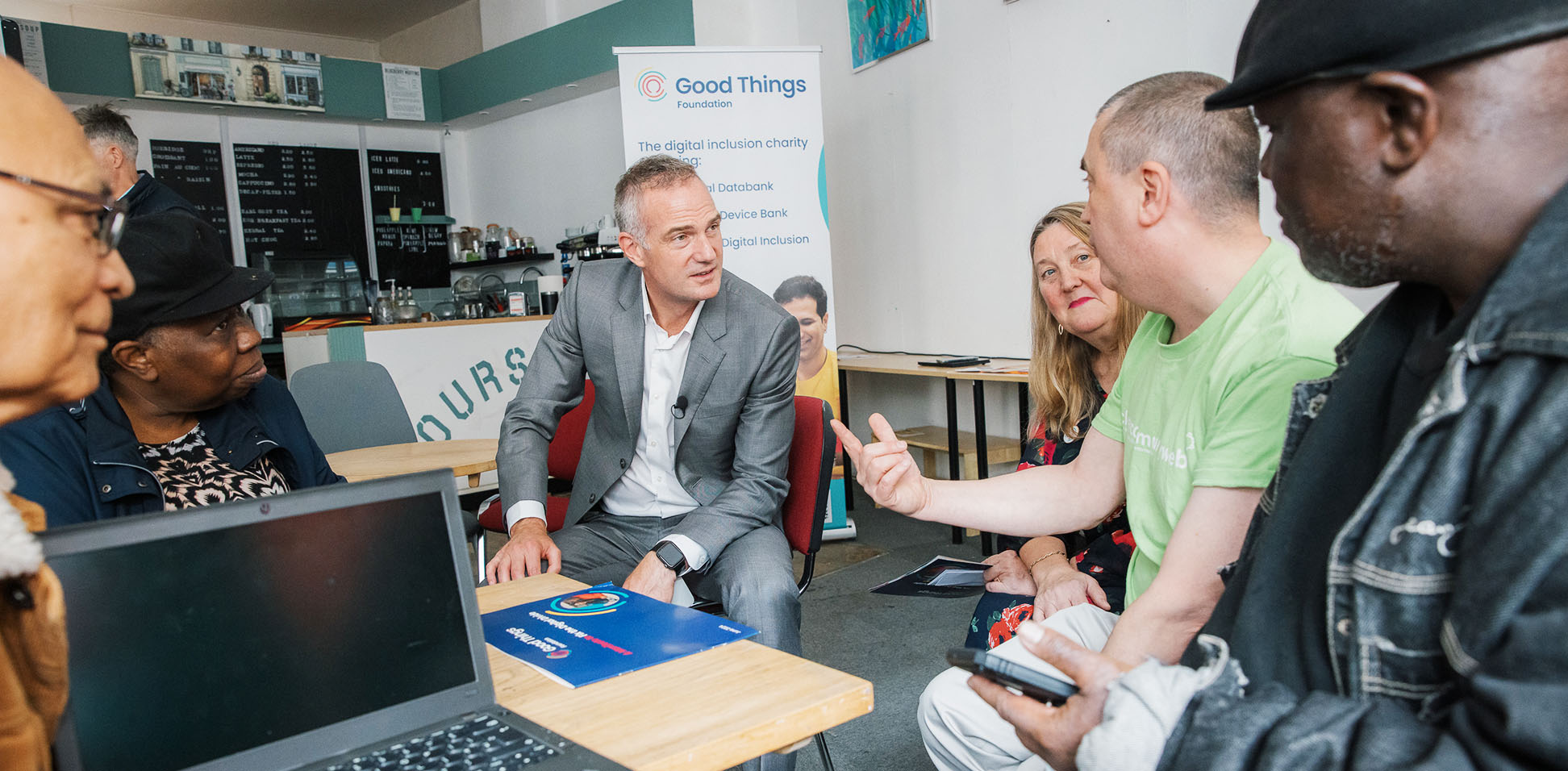2024: Good Things Advocacy Round Up
A year of progress: The digital inclusion landscape in the UK has undergone significant shifts in 2024 and this blog by Natasha Bright-Wray, our Associate Director of Communications, Campaigns and Advocacy explores all the Good Things.
The digital inclusion landscape in the UK has undergone significant shifts in 2024, both with the changing political landscape and the evolving technological environment. Good Things has been leading the way, working with our cross-sector partners to deliver digital inclusion services, learning about what works, staying on top of emerging tech, campaigning for significant policies that will bridge the divide and convening the experts.
Convening the experts
At the start of the year, we launched Digital Futures For Good - our in-depth conversation series that brings together leading experts who are working to help people affected by digital inclusion, in their sectors. Our expert guests talked about their experiences, and how digital inclusion overlaps with their work - exploring the innovative initiatives and policies necessary to fix the digital divide.
We proudly kicked off with two members of the House of Lords Communications and Digital Committee, who wrote the damning Digital Exclusion and Cost of Living report in 2023 - assigning government apathy for the worsening of the issue. Helen welcomed Martha Lane Fox to the series, a tireless advocate for digital inclusion, Martha shared her vision for a Modern Britain, calling for immediate leadership.
A year of solid research
Alongside our conversation series, we continued with our work in partnership with University of Liverpool and other partners on the Minimum Digital Living Standard, launching our report exploring the standard for households with children. Already adopted by the Welsh Government as part of a vision for digital inclusion in Wales, this research is a citizen-centred definition of what counts as digital inclusion or exclusion.
2024 saw Good Things assemble the latest research from across the board, launching our Digital Nation 2024 infographic just in time for the General Election, and alongside Lloyds Banking Group, Nominet and University of Liverpool we launched Digital inclusion: What the main UK datasets tell us, following our work to host four cross-sector roundtable discussions.

Later in the year we demonstrated the need for people and provision in communities, with our Power Up report and the importance of media and digital literacy for people with no or low digital skills when learning about AI. We rounded off the year alongside Trussell and our strategic partner, Vodafone, exploring the links between digital exclusion and deep poverty, following our interview with Emma Revie earlier in the year.
A shock General Election
The surprise election saw Good Things spring into action, bringing forward the launch of our Manifesto, with policy asks that shine a light on the ABC’s of digital inclusion:
- Affordable access: Free or affordable internet connectivity, data, and devices for all.
- Basic digital skills: The opportunity to learn and acquire essential digital skills at any stage of life.
- Community support: Helping people experiencing digital exclusion to get online locally.
During the pre-election period, we organised a visit to a digital inclusion hub, ClearCommunityWeb in Croydon, for the now newly appointed Secretary of State for DSIT, Peter Kyle. Kyle was able to witness firsthand the vital role that communities plan in delivering digital inclusion services, and met with volunteers who have gone from no digital skills, to supporting others to benefit from digital. The visit came after Kyle’s speech at London Tech Week, outlining his ambitions to fix the digital divide, by working with charities like Good Things.
Renewed focus
The new government elected in 2024 has brought a renewed focus on digital inclusion. With a Minister with a Digital Inclusion brief, new teams of civil servants rallied, determined to understand more about what should be included in an action plan.
Good Things hosted four roundtable discussions on behalf of the Department for Science, Innovation and Technology, to explore: Access, Digital Services, Skills and Confidence and Engagement. The roundtables, hosted over two days, convened experts from all sectors to help shape the national response to the issue.
Party conferences
As the leaves started falling, we packed our sandwich boards and Digital Nations and jumped on trains, covering the Liberal Democrats, Conservative and finally the Labour party conferences. This exhausting period saw Good Things on multiple panel discussions, queuing to hear the ambitions and plans of all parties following the change in Government after 14 years of Conservative rule.
Digital futures
Throughout the year, we continued to see all parties shining a light on advances to tech, providing a vehicle for important discussions about how emerging tech also exacerbates the digital divide. In Digital Futures for Good, we were joined by AI authority and thought leader, Nina Schick. Nina and Helen's discussion highlights the impact and role of AI both currently and on the future of digital exclusion - explaining how it's similar to the transformative power modern computing has had on society.
We explored just and compassionate futures, and how we support those living in poverty with Trussell’s Emma Revie; localised approaches with Greater Manchester Mayor Andy Burnham and members of the National Digital Inclusion Network. We reflected on Keir Starmer’s first 100 days as Prime Minister, and what his next steps should be with FutureDotNow’s Liz Williams. Finally we ended the year with a double-whammy of episodes:
- Interviewing Rt Hon Alan Milburn for a discussion on the Pathways to Work Commission report. With Milburn’s extensive experience as former Chief Secretary to the Treasury and Secretary of State for Health, the episode focuses on the key insights from the Commission’s findings on how to enhance access to employment in a rapidly digitising economy.
- In light of HM Treasury’s Financial Inclusion Committee, with Digital Inclusion sub-committee, new member Helen Milner was joined by fellow member Professor Martin Coppack alongside four experts to explore the significant, and increasing, links between financial inclusion and digital inclusion. With different perspectives - business, regulatory, and civil society - the panellists shared their assessment of the challenges and opportunities for cross-sector collaboration and innovation.
Community support
Our annual campaign Get Online Week was the largest one yet, with thousands of people benefiting from digital inclusion services in their communities. This year, we kicked it off with a launch event at the House of Lords, hosted by Sir Chris Bryant, Minister for Digital Inclusion at DSIT.
The event followed a visit by Minister Bryant with Good Things to YMCA Newcastle, a digital inclusion hub in Walker, Newcastle. Only a month later, Minister Bryant joined his colleague Secretary of State for DSIT, Peter Kyle and the Good Things team at BGfm, a community radio station in South Wales, and part of the National Digital Inclusion Network. The team at BGfm spoke about how they embed digital inclusion in their employability offer, giving people real work experience and the opportunity to shape their futures and explore their passions at their incredible community hub.
What’s next
The hub visit in Wales was followed by another engagement opportunity: a roundtable discussion alongside our colleagues in Cwmpas and Welsh Government.
Our Group Chief Executive, Helen Milner, took a role as a Non-Executive Director on the DSIT board - stepping away from digital inclusion conversations and using her position to be the voice of digitally excluded people and civil society in discussions about AI and emerging tech - a necessary position.
We are currently waiting in anticipation to see what the next steps are for the Government. We’re looking forward to seeing an action plan on digital inclusion that supports the cross-sector initiatives already tackling the issue. We want the barriers facing people today to be removed, including digital skills support, and access to affordable connectivity and devices. We believe that solutions can be co-created - drawing on the expertise and experience of many stakeholders. Solutions need to be delivered across the whole of Government, and co-funded alongside the private sector.
What will next year bring? I can't wait to find out!
